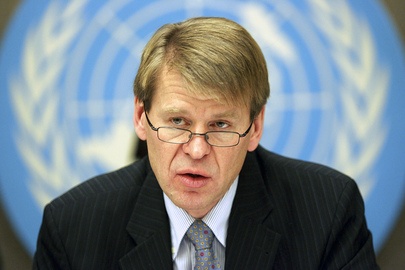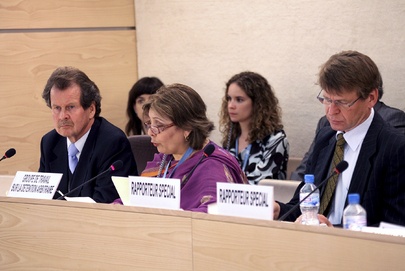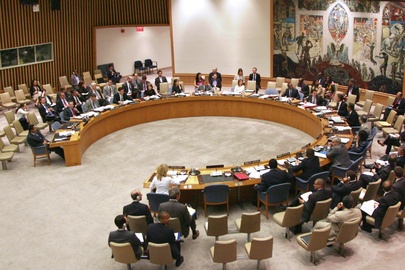


An independent United Nations human rights expert today said that the new procedure adopted by the Security Council on the listing of individuals and organizations under the international sanctions regime against terrorism still fails to address the human rights shortcomings in the process, (I would translate such potential shortcomings as more in rule of law considerations, although either terminology is appropriate). The Council, in two resolutions adopted on 17 June, split the sanctions it has imposed on Al-Qaida and those against the Taliban, creating two lists of individuals and organizations so that they can be treated separately. (From UN News Centre Resources). Sanctions originally created for the Taliban were converted into a global Al Qaida terrorist listing regime, while the Taliban will be covered by resolution 1988 which is based on a territorial limitation and the identification of the situation in Afghanistan as constituting a threat to international peace and security.
Rule of Law Shortcomings & Judicial Challenges?
In a statement issued in Geneva, Martin Scheinin,(TOP PHOTO Above), the UN Special Rapporteur on human rights and counter-terrorism, said “the Al Qaida sanctions regime under resolution 1989 does not, judged by the letter of the resolution, remedy the human rights shortcomings expressed in relation to the earlier consolidated list.” (See FILM REPORT on RESOLUTION ADOPTED
diplomaticallyincorrect.org/films/movie/taliban-reality/27436 ) Judicial challenges to the listings are likely to continue, he said. “Due to the unsatisfactory level of due process guarantees such as disclosure of information and a right to an effective remedy, the strengthened role of the ombudsperson is unlikely to satisfy national or European courts that the safeguards at the United Nations level are sufficient, so that these courts could allow deference instead of exercising their jurisdiction over the national or European measures for the implementation of the sanctions,” said Mr. Scheinin.
Conditions to Remedy:
He added that his assessment may change if Security Council members are prepared to secure the following conditions:
• Any listing proposal require the submission of the full set of information that is used as the substantive basis for the listing proposal;
• The person or entity subjected to the listing proposal has the right and practical means to effectively challenge the proposal;
• The delisting ombudsperson has access to the full set of information used for the listing;
• The delisting recommendations by the ombudsperson or delisting proposals by the designating State are in practice respected.
“If these conditions are met in the implementation… the Special Rapporteur finds it likely that national or European courts will require listed individuals or entities to exhaust the delisting procedure of the ombudsperson before exercising their jurisdiction in relation to the national or European implementing measures,” said Mr. Scheinin.
Some of the same rule of law and human rights concerns though may exist within a national context. It is not only about secret renditions and “black sites” that may have existed or perhaps still do even putting aside Guantanamo. There has not been consistent accountability for such events over the last decade. Further, “no-fly lists” persist without transparency or real opportunity for judicial review. Again, the interests of security and combating terrorism versus rule of law and human rights considerations will continue.
Understanding that China, the Russian Federation as well as the United States are Permanent Members of the Security Council (as well as many states with dubious rule of law/human rights records elected as non-Permanent Members), then it may be expected that this national perspective will be gradually translated into the work of the UN Security Council. Will UN Security Council trend toward a philosophy of security concerns trump rule of law and human rights considerations? That would be unfortunate where international legal standards are just taking root within many national systems and at least up to now have been the most secure safeguard in many states against abuses by governments employing the reality or pretext of terrorism to stifle not only dissent but “deviancy,” (deviation from conformism particular to any society). The role of United Nations Rapporteurs has evolved in importance in challenging repressive national regimes. Will it though become necessary for rule of law/human rights experts and defenders to increasingly challenge a regressive tendency in multilateral forums where frequently transparency and judicial review may be even more wanting as compared to established democratic-open societies?
Related Report “Have You Heard of UN Security Council 1540 Committee?”-
diplomaticallyincorrect.org/films/blog_post/have-you-heard-of-the-un-security-council-counterterrorism-1540-committee-by-ambassador-mo/27330
By Ambassador Muhamed Sacirbey
Facebook – Become a Fan at “Diplomatically Incorrect”
Twitter – Follow us – DiplomaticallyX
More Related Reports at “War Crimes Justice Channel”
diplomaticallyincorrect.org/c/war-crimes-justice





